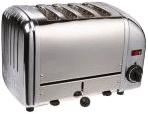|
I
Paid $250 For A Toaster
How
High Price Can Help You Verify High Quality
And Actually Increase Customer Satisfaction
From
the desk of Timothy A. Gross
Yep,
I'm the proud owner of a $250 toaster... "Engineered
in England and hand-assembled to the last detail".
Am
I An Idiot?
...Well
that's above and beyond the scope of this article
(smile), but as far as the toaster purchase, I did
a lot of research online about it first (I'm not one
to spend 10x the money on something without researching
it first), and here's what I learned: |
 by
Dualit
by
Dualit |
Reading
consumer product reviews of it online, overall there were
two types of reviews:
1)
Most purchasers love it. A lot of the reviews say something
like,
-
"It's only a toaster I know, but there's just something
about it that gives you a sense of satisfaction."
-
"...My Dualit however sits proudly
among an array of kitchen goodies "
-
"After
years as a Dualit owner, I still get a certain
pleasure from using its sensible, rugged controls..."
"Three years later I've come to the conclusion that
I couldn't live without this thing..."
2)
People who haven't bought it but feel compelled to
give it a review anyway, say things like, "
...Yeah,
I'm starving too, that's why I need a toaster! (joke)
But
all joking aside, I believe that at least some of the personal
satisfaction and "happiness" this toaster apparently
brings its owners is due to how much they paid for
it.
They
may not be rich, but they splurged on something to get what
they believe to be top-quality, and they're reminded of
that decision (and feel good about that decision) every
morning when they make breakfast.
Some
Important Points About High Pricing:
-
The
toaster feels extra special to them because they paid
$250-$320 for it.
-
If
it was valued at $300 but they'd been able to buy it for
$60 due to some "going out of business" store
sale or something, they'd still feel proud of it.
-
...But
if the toaster was valued at $60 and anybody could
get it for that price at any Target or K-Mart nationwide,
they'd still think it was a nice toaster, but they probably
wouldn't have such strong feelings about it.
In
other words, part of their pride of ownership is in the
perceived value of it, and how much they paid for it.
Next
Point:
At
$60, this toaster would be a no-brainer. But at $250+, I
didn't order it for a couple of days. I spent some time
and:
-
I
read the product description.
-
I
read the customer reviews online and looked for more
product reviews online.
-
I
searched for alternatives that might still be high quality
but at a cheaper price
-
I
mulled it over in my head
...And
when I finally decided to order it and it arrived at my
doorstep, I was excited to open the box!
I
wouldn't have been excited to open up a toaster if I'd bought
it at a local store for $60 in a close-out sale by chance,
without having researched what I was getting and understanding
the value and quality I was getting.
Here's
The Emotional Timeline:
-
The
high price point forced me to research the product, not
just buy it on a whim.
-
The
pre-purchase research I did made me discover the attractive
qualities of the product, and the customer reviews saying
"it makes me feel good every time I walk into the
kitchen" set up my expectations of
feeling the same way when I got it.
-
Deciding
to buy it was a bit of an internal struggle (it sounds
kind of stupid, but there's some emotional turmoil involved
with making high-ticket purchases like a car, house, attending
a seminar, etc.)
-
When
I finally clicked the "purchase" button (I ordered
it online), it resolved the inner conflict I'd been having
about it (because I'd made a decision)
-
At
that point, I was really looking forward to receiving
the product, and all of this set me up for the final point:
-
When
I received it, I was pre-programmed to be pleased with
it. It didn't have to prove itself to me, that
had already been done for me in the pre-purchasing phase
as I was researching it.
The only thing that could have disappointed me when I
received it is if it were broken, defective, or that I
felt I'd somehow been misled by the product description.
(Like if it were actually made of plastic instead of metal.)
Conclusion:
The
price alone caused this product caused it to transcend
the normal buying experience of getting a new toaster. (Because
normally there is no "buying experience"
of getting a new toaster)
What
can YOU do to transcend the normal buying experience of
your product? If you have a quality product, can drastically
increasing your prices actually lead to higher customer
satisfaction?
Something
to think about. To your success, Tim Gross

Related
Articles:
A
Foolproof Way To Maximize Your Future Product's Sales
DO NOT Create Any New Products Without Reading This
Sneaking
In To Universal Studios
Or: "When Is An Ad NOT An Ad?"
|

